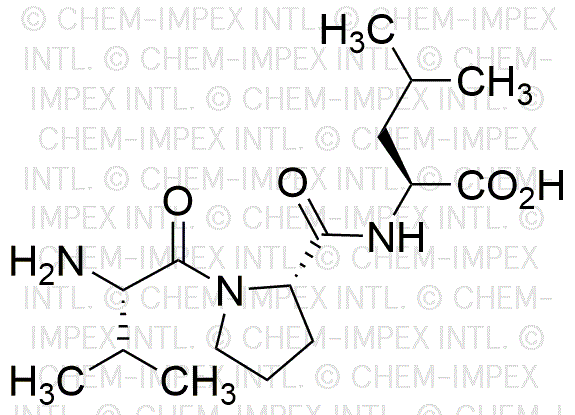Diprotin B is widely utilized in research focused on:
- Biotechnology: It serves as a potent inhibitor of prolyl endopeptidases, making it valuable in the development of therapeutic agents for conditions like hypertension and diabetes.
- Pharmaceuticals: Researchers leverage its properties to enhance drug formulations, improving the stability and efficacy of peptide-based medications.
- Food Industry: Diprotin B is explored for its potential to inhibit certain enzymes, which can help in preserving food quality and extending shelf life.
- Cosmetics: Its ability to modulate protein interactions is being studied for applications in anti-aging products, offering benefits in skin elasticity and hydration.
- Research on Neurodegenerative Diseases: The compound is investigated for its neuroprotective effects, potentially aiding in the treatment of diseases like Alzheimer's and Parkinson's.
Informations générales
Propriétés
Sécurité et réglementation
Applications
Diprotin B is widely utilized in research focused on:
- Biotechnology: It serves as a potent inhibitor of prolyl endopeptidases, making it valuable in the development of therapeutic agents for conditions like hypertension and diabetes.
- Pharmaceuticals: Researchers leverage its properties to enhance drug formulations, improving the stability and efficacy of peptide-based medications.
- Food Industry: Diprotin B is explored for its potential to inhibit certain enzymes, which can help in preserving food quality and extending shelf life.
- Cosmetics: Its ability to modulate protein interactions is being studied for applications in anti-aging products, offering benefits in skin elasticity and hydration.
- Research on Neurodegenerative Diseases: The compound is investigated for its neuroprotective effects, potentially aiding in the treatment of diseases like Alzheimer's and Parkinson's.
Documents
Fiches de données de sécurité (FDS)
La FDS fournit des informations de sécurité complètes sur la manipulation, le stockage et l’élimination du produit.
Spécifications du produit (PS)
Le PS fournit une description complète des propriétés du produit, notamment sa composition chimique, son état physique, sa pureté et les exigences de stockage. Il détaille également les plages de qualité acceptables et les applications prévues du produit.
Certificats d'analyse (COA)
Recherchez des certificats d'analyse (COA) en saisissant le numéro de lot du produit. Les numéros de lot et de lot se trouvent sur l'étiquette d'un produit, après les mots « Lot » ou « Lot de fabrication ».
Numéro de catalogue
Numéro de lot/série
Certificats d'origine (COO)
Ce certificat d'exploitation confirme le pays dans lequel le produit a été fabriqué, et détaille également les matériaux et composants utilisés et s'il est issu de sources naturelles, synthétiques ou autres sources spécifiques. Ce certificat peut être requis pour les douanes, le commerce et la conformité réglementaire.
Numéro de catalogue
Numéro de lot/série
Fiches de données de sécurité (FDS)
La FDS fournit des informations de sécurité complètes sur la manipulation, le stockage et l’élimination du produit.
DownloadSpécifications du produit (PS)
Le PS fournit une description complète des propriétés du produit, notamment sa composition chimique, son état physique, sa pureté et les exigences de stockage. Il détaille également les plages de qualité acceptables et les applications prévues du produit.
DownloadCertificats d'analyse (COA)
Recherchez des certificats d'analyse (COA) en saisissant le numéro de lot du produit. Les numéros de lot et de lot se trouvent sur l'étiquette d'un produit, après les mots « Lot » ou « Lot de fabrication ».
Numéro de catalogue
Numéro de lot/série
Certificats d'origine (COO)
Ce certificat d'exploitation confirme le pays dans lequel le produit a été fabriqué, et détaille également les matériaux et composants utilisés et s'il est issu de sources naturelles, synthétiques ou autres sources spécifiques. Ce certificat peut être requis pour les douanes, le commerce et la conformité réglementaire.


